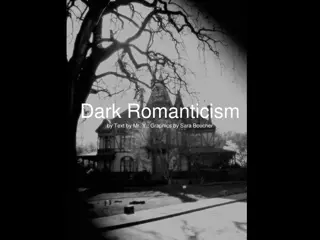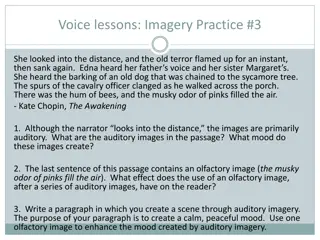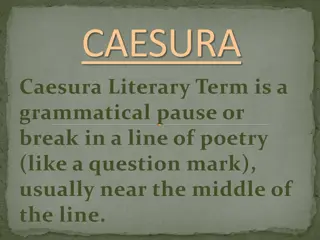The Tragic Life and Legacy of Edgar Allan Poe
Edgar Allan Poe, known for his tales of mystery and terror, led a tragic and unhappy life plagued by personal losses, struggles with addiction, and financial hardships. Despite his challenging circumstances, he left behind a remarkable literary legacy that continues to captivate readers today.
Download Presentation

Please find below an Image/Link to download the presentation.
The content on the website is provided AS IS for your information and personal use only. It may not be sold, licensed, or shared on other websites without obtaining consent from the author. Download presentation by click this link. If you encounter any issues during the download, it is possible that the publisher has removed the file from their server.
E N D
Presentation Transcript
The Masque of the Red Death Edgar Allan Poe
Edgar Allan Poe 1809-1849
His Family and Tragic Life Born in Boston The son of traveling actors Lived a tragic and unhappy life
Tragic and Unhappy Life Mother died of tuberculosis when Poe was one Father deserted him at the age of two Adopted by Mr. and Mrs. John Allan Had constant disagreements with his step-father John Allan John Allan
. . . continued Studied briefly at the University of Virginia Drinking and gambling difficulties kept him from continuing at UVA University of Virginia, 1856 University of Virginia, 1856
. . .continued Received an appointment to West Point, but provoked his own dismissal Caused a final separation between himself and step-father West Point Crest West Point Crest
. . .continued In 1836 married his 14 year old cousin, Virginia Last 12 years of life worked as journalist, editor, and creative writer Virginia Clemm
. . . continued Lived in poverty stricken conditions most of his life In 1846 wife died after a long illness Poe s home during the 1840 s
Addiction All evidence suggests that Poe was an alcoholic. Poe also habitually used drugs such as morphine, opium, and laudanum to treat depression and other health conditions. Poe had a weakened nervous system due to a brain lesion and a heart condition. Laudanum, a highly addictive, opium based medicine, was commonly used to treat headaches and stomach pains in 1800 s.
. . . continued Died in Baltimore after having been found in a drunken stupor Died a poor man
Poes Work Known for: Tales of mystery and terror stories Introducing the modern detective story
Just a Few Titles Short Stories: The Tell-Tale Heart The Cask of Amontillado The Black Cat, The Pit and The Pendulum Poems: The Raven Annabel Lee To Helen Lenore
Literary Term: Allusion Reference to a famous historical or literary figure or event Best sources are literature, history, Greek mythology, and the Bible Serves to explain or clarify or enhance whatever subject
Literary Term: Gothic Elements Supernatural horrors and an atmosphere of unknown terror pervades the action High emotion, sentimentalism, but also pronounced anger, surprise, and especially terror Use of words indicating fear, mystery: apparition, devil, ghost, haunted, terror, fright, fainting
Literary Term: Symbol Something that is itself and yet also represents something else Universal symbols embodying universally recognizable meanings Invested symbols give symbolic meaning by the way an author uses them in a literary work Symbols are very common in literature
Allegory: A Story Behind a Story An allegory is a narrative that is really a double story. One story takes place on the surface. Under the surface the story s characters and events represent abstract ideas or states of being, things like love or freedom, evil or goodness, hell or heaven. To work, an allegory must operate on two levels. On the level of pure storytelling, an allegory must hold our attention. Its characters must seem believable and interesting enough for us to care about them. On the allegorical level the ideas in the story must be accessible to us. As you read, you should find that the allegorical level of the story gradually begins to strike you. See if you find that Poe s story of arrogance and death hooks you on both levels.
The Masque of the Red Death: Background Poe s fictional Red Death is probably based on the Black Death, which swept fourteenth-century Europe and Asia, killing as many as two thirds of the population in some regions in less than twenty years. Poe calls the plague the Red Death because victims oozed blood from painful sores. In this story a fourteenth-century prince gives a costume party, or masque, to try to forget about the epidemic raging all around him.
The Black Death This particular type of plague was the bubonic plague, which is caused by a bacteria that lived in rats and other rodents. Human beings were infected through bites from the fleas that lived on these rats. The symptoms associated with plague are bubos, which are painful swellings of the lymph nodes. These typically appear in the armpits, legs, neck, or groin. If left untreated, plague victims die within two to four days. Victims of this disease suffered swelling in the armpit and groin, as well as bleeding in the lungs. Victims also suffered a very high fever, delirium, and prostration.
Summary Poe s tale of an eccentric nobleman and the Red Death ravaging his land can be read both as a chilling ghost story and as an allegory representing human folly and the inevitability of death. (In other words, you cannot hide from death regardless how much money you have.)
Summary Prince Prospero invites a thousand lords and ladies to escape death by living luxuriously in his castle until the pestilence passes. To entertain his guests Prospero hosts a masquerade party that takes place in seven halls, each a different color.
Summary At the stroke of midnight, a tall figure in a blood- splattered burial costume appears. Prospero demands that his friends seize the intruder, but everyone is frozen with fear as the stranger slowly walks through the rooms. Finally, Prospero rushes after him into the black seventh room.
Summary When the intruder turns, the host falls dead. The revelers then grab the stranger but find the costume empty. All soon die of the Red Death.
Comments The allegorical meaning of the story is found in such details as Prospero s name (Prospero means prosperous) Unfortunately, the Red Death attacks the rich and poor alike The stranger s appearance (Dressed like the Grim Reaper or Death) The arrangement of the seven halls The rooms of the palace, lined up in a series, allegorically represent the stages of life. Their colors, particularly the black (death) and red (blood) of the westernmost room with its ebony clock marking the inevitable passage of time. No matter how beautiful the castle, how luxuriant the clothing, or how rich the food, no mortal, not even a prince, can escape death. -Sparknotes.com
This powerpoint was kindly donated to www.worldofteaching.com http://www.worldofteaching.com is home to over a thousand powerpoints submitted by teachers. This is a completely free site and requires no registration. Please visit and I hope it will help in your teaching.























